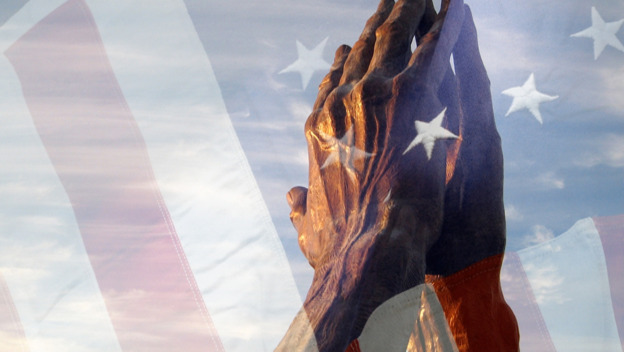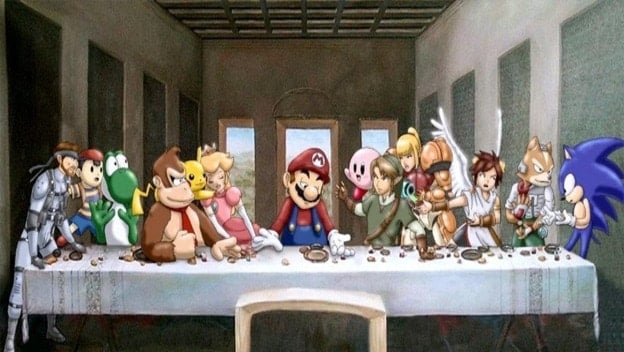Every once in a while, amid the addicting RPGs and fast-paced bullet-fests, a uniquely personal and thought-provoking game will come along. A game that forces the player to pit their morality against their beliefs, and have the victor duke it out with the game’s content. As much of the gaming population is already aware, BioShock: Infinite is just that. Religious practices, social prejudice, manslaughter, and racism are prevalent throughout the game, and encourage the player to evaluate these sensitive topics in a different light. However, not everyone was happy with the experience. These unhappy reactions do not stem from the graphic and disturbing nature of the game, but from the way the game presents religion. This focused repulsion centered on a taboo topic produces no good, only harm.
Controversy diminishes the impact of a story. This diminishing impact is a shame because the BioShock games tell some of the best stories gaming has ever seen (the inclusion of BioShock 2 is debatable). Good stories, however, do not avoid controversial topics. BioShock knows this and, instead of tarnishing its quality by being timid, it embraces taboos that other game developers would never touch.
Near the beginning of BioShock: Infinite, the game forces the player to participate in a violent baptismal scene. In this scene, a player must accept a baptism to enter into the city of Columbia where most of the game occurs. This baptism is perverted, exaggerated, and violent. It also has created the strongest of the public backlashes.
As our own Josh Engen pointed out, several Christian players have requested a refund for the game, as they felt they could not continue with its content without going against their beliefs. The demand was so large, in fact, that Valve began refunding copies of the game sold through Steam. Compared to the rest of the game, the baptism scene is very mild. Why are religious undertones a problem, but murder and severe racism perfectly passible?
A majority of video games consist of slaughtering hundreds of enemies without a shred of hesitation on the player’s part. Ken Levine, the main force behind BioShock: Infinite, has said that the major problem in creating a first person shooter is that you’re essentially telling a story about a mass murderer. Most of these people who demanded a refund for BioShock have played a video game before. If putting thousands of virtual bullets into thousands of virtual people didn’t offend them, why would one virtual baptism?
Why is religion a step too far?
This stems from the flawed concept of “acceptable” that has become the norm for video games. Video games contain an absurd amount of morally repugnant behavior. The game Assassin’s Creed is literally about assassinating people. If you show the slightest sign of addressing religion in any sort of critical way, however, people will start waving picket signs at you. I’m not here to question anyone’s religious beliefs; I’m just highlighting the stupidity of how video games are evaluated. Gaming, like other mediums, requires the input of many different people of many different belief backgrounds to survive. Censoring a certain topic, like religion, and not censoring others, like unchecked genocide, is absurd.
Why, then, do situations like these—where a game simply isn’t allowed to mention a topic—arise? Let me correct myself, it’s not that games aren’t allowed to mention religion, it’s that they aren’t allowed to mention it in a negative way. There are two sides to every coin. Yet we don’t hear anything about the comfort that religion gives the refugees of Fallout, or the survivors in Resistance. The Infamous games encourage the player to sympathize and aid a battered and decimated city, but we haven’t heard jack about them. Mirror’s Edge depicts a small organization’s efforts to liberate an enslaved city, but you haven’t seen the game’s heroine, Faith, pop up in the New York Times. Video games are often considered a threat by the main stream media because of the immoral way they depict life; then why, when games “get it right”, are they ignored?

Video games don’t receive fair treatment by the public eye. Criticisms get catapulted towards the medium on a daily basis. Never will you see anyone other than a game journalist comment on the quality of this game or that game. You will see, however, every media outlet criticize games for being too violent or too sexual or too whatever. Video games are either important enough to be discussed by the public or they’re not. The impact of the content of games should be equally weighed, both good and bad.
Were the aforementioned Christian players wrong to dislike the latest BioShock? Not at all. However, their reactions help illustrate the point that it’s ridiculous to have an overreaction to video games compared to other media. It’s time we get over our video game trauma. Just like any other medium, games can have some sort of intrinsic value, or they can be crap. The fuss over an examination of a specific topic like religion doesn’t do anything to improve the quality of gaming, only threatens to hamper the creativity of future game makers by inspiring fear and timidity.
| By Austin Wood Contributing Writer Date: April 17, 2013 |
